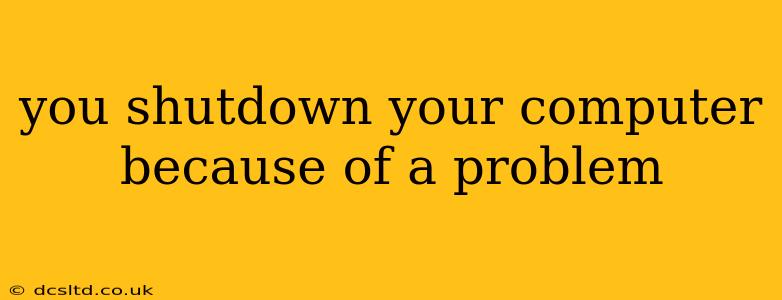My Computer Suddenly Shut Down: Troubleshooting the Unexpected Power-Off
A sudden computer shutdown is frustrating, especially when you're in the middle of something important. This unexpected power-off can stem from various issues, from minor software glitches to more serious hardware problems. This guide will help you diagnose the cause and get your computer back up and running smoothly.
Why did my computer shut down unexpectedly?
This is the most common question after experiencing a sudden shutdown. The reasons are diverse and can range from simple fixes to more complex repairs. Let's explore some of the most frequent culprits:
Overheating:
One of the most prevalent causes is overheating. Your computer's components, especially the CPU and GPU, generate significant heat during operation. If the cooling system – fans, heatsinks, or thermal paste – fails to dissipate this heat effectively, the system will automatically shut down to prevent damage. Signs of overheating include unusually loud fan noise, unusually high CPU temperatures (easily monitored with programs like HWMonitor or Core Temp), and the computer shutting down after periods of heavy use (gaming, video editing, etc.).
Power Supply Issues:
A failing power supply unit (PSU) can also cause unexpected shutdowns. The PSU provides power to all components. If it's not delivering sufficient or stable power, your computer may shut down unpredictably. Signs of a failing PSU include unusual noises coming from the PSU itself (clicking, buzzing, whining), erratic behavior (frequent freezing or restarts), and the computer only turning on intermittently.
Software Glitches:
Software problems can sometimes trigger a system crash leading to an immediate shutdown. Corrupted drivers, faulty software updates, or even a simple software bug can cause instability and force a shutdown. Restarting your computer often resolves temporary software glitches. However, if the problem persists, you may need to troubleshoot specific software or drivers.
Hardware Failure:
More serious hardware problems such as failing hard drives, RAM issues (Random Access Memory), or failing motherboard components can cause unexpected shutdowns. These problems often manifest with other symptoms, such as the "blue screen of death" (BSOD) in Windows, data corruption, or system instability.
Driver Problems:
Outdated, corrupted, or incompatible device drivers are another common source of system instability. These drivers are essential software components that allow your operating system to communicate with your hardware. Outdated or corrupted drivers can lead to conflicts and system crashes.
Dust Accumulation:
Excessive dust buildup inside your computer case can impede airflow and hinder cooling, contributing to overheating and ultimately, unexpected shutdowns. Regular cleaning is crucial to maintain optimal cooling performance.
How can I prevent future unexpected shutdowns?
Preventing future shutdowns involves a combination of proactive measures and troubleshooting steps:
- Monitor your temperatures: Use monitoring software to keep track of your CPU and GPU temperatures. High temperatures are a clear indicator of a potential problem.
- Clean your computer: Regularly clean the inside of your computer case to remove dust buildup. Compressed air is an effective tool for this purpose.
- Update your drivers: Ensure all your device drivers are up-to-date. Check the manufacturer's website for the latest drivers.
- Run a virus scan: Malicious software can sometimes cause system instability and crashes.
- Check your power supply: If you suspect a PSU problem, consider having it tested or replaced.
- Consider upgrading components: If your computer is older, upgrading components like the CPU, GPU, or RAM can improve performance and stability.
By following these steps and carefully considering the potential causes outlined above, you can effectively diagnose and resolve the issue leading to your computer's unexpected shutdowns, ensuring a more stable and reliable computing experience. If you're unsure about any of these steps, it's always best to consult a qualified computer technician.
